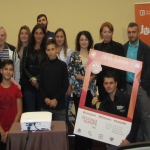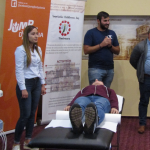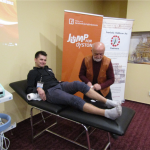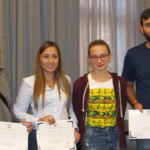People with dystonia have participated, as well as their families or but also specialists in the field of rehabilitation. From three cities in Romania -Timisoara, Zalau and Baia Mare.
Before the workshop, the patients had a social meeting, in the Dr I.Trifon Medical Clinic, where they could visit the cabinet where physiotherapy is practiced. During the social meeting they benefited from salinotherapy this being a very relaxing and useful social environment for participants.
The next day September 21st, at the request of patients who over the time wanted to find out how acupuncture can help in their rehabilitation, the event was opened with the acupuncture workshop coordinated and presented by Dr. Ioan Ometa.
This part of the workshop proved to be quite useful by giving many positive answers for patients. Also in this framework it was discussed moreover about the social integration and the introduction on the labor market of people with disabilities, the presentation being supported by a vocational counselor who guides people with disabilities towards autonomy and a good integration on the labor market.
This was followed by physiotherapy rehabilitation workshops coordinated by two physiotherapists representatives of the Medical Clinic, Dr Cioata Ionel Trifon-from Timisoara
The second part of the physiotherapy workshop was coordinated by the physiotherapist accompanied by a general medical assistant, both representatives of the Noro Center from Romania who have experience in working with patients with rare diseases but also with groups of patients with dystonia.
The event ended with the presentation of a physical rehabilitation program through sports adapted to the patients with dystonia whose condition allows them to do such activity, coordinated and designed by trainer Crainic Marius, who says that ”Rehabilitation programs are essential for the relief of dystonia symptoms. Physiotherapy teaches people with dystonia to recognize certain compensatory movements, the supervision of the specialist doctor is necessary. Physical and psychological rehabilitation are slow, the results appear in time, but improvements can be made through several aspects, movement awareness and control. Sport has a great importance in the life of every human being as far as he can practice it and together with the other therapies can significantly improve the quality of life of people with dystonia ”.
”We want to inform patients about the rights they have, about the treatments that are good practice so that they can choose from what is available in order to have a good quality of life”.
Also being the dystonia awareness month we will have the opportunity to popularize this diagnosis and the therapies that come into the benefit of patients ”says Crainic Catalina, president of the Childrens Joy Association
Childrens Joy Association is the only active association in Romania for dystonia in the city of Timisoara, being a member of the board of directors of the National Alliance for Rare Diseases through the president Crainic Catalina, who is also a board member of the Dystonia Europe.
Catalina Crainic, Board Member Dystonia Europe and President The Childrens Joy Association, Romania




